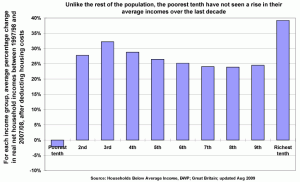Labour – building an unfairer Britain
Posted by Andy Bowden in Uncategorized, tags: austerity britain, economy, Labour, Tories, workers' rightsThis time last year it looked almost certain that Labour would not only lose the election, but be absolutely humiliated by the Tories. They had not only dropped in the polls, but actually came third in the European Elections. Within the past month however, Labour’s electoral fortunes have resurged, Lazarus like. It is not an overwhelming resurgence – they are still behind the Tories in %’s in all polls, but thanks to the UK’s electoral boundaries they could get less votes than the Tories but win more seats. This has happened before in UK voting history. Even if they do win more seats than the Tories however, they would at best have a minority Government. 
This is increasingly the best Labour can hope for – though it is not an impossibility. A Labour Government could either run the country as a minority Government, like the SNP do in Scotland – or they could form a coalition with the Libdems. This electoral scenario should give hope to Socialists, as it means at a time when the bankers need a strong Government to push through ruthless and brutal cuts the UK will actually have the weakest Government in decades.
Labour have already tried to steal the Tories thunder by claiming that their cuts will be “deeper than Thatcher’s”. That should send a chill down the spine of millions of working people in the UK, especially as it is being said BEFORE a general election. At the same time Labour are saying they will defend frontline services – it’s bizarre that both Cameron and Brown believe they can both make savage cuts but not attack peoples communities, education, and NHS. It’s a con trick that will be exposed when they start to try and make those cuts, and the left has to be able to organise and fight back like we did in the SOS campaign.
Despite New Labour trying to retake Tory ground quite clumsily, they are still managing to stay in the polls with a fighting chance – why? The most sensible explanation is that the real threat of a Tory Government has mobilised Labour’s old working class support to vote for them. Despite hatred of Labour, millions of people can remember Thatcherism and will vote for a lesser evil to stop it. Also, again in a crude and disingenuous way Labour are using class as a tactic. From Gordon Brown attacking Cameron’s Eton background, to their “Fairer for All” sloganeering Labour are trying desperately to carve out some difference between them and the Tories.
For the past 13 years Labour have dropped ideology from their politics – they got elected on the basis they were the best “administrators” of the UK. They could rely on most of their working class base and large sections of the middle class to vote for them on this basis. Now that the economy has collapsed so badly, Labour can’t pretend to be competent apolotical admins. They have to create some kind of false divide between them and the Tories, and they are having some success in exploiting widespread anger at privilege to pose as the defenders of the working class majority.
This crude posturing was supposed to be the reason Labour could not win elections – mentioning class was meant to lead to electoral disaster. Yet right now, it is probably the only tactic that could keep Gordon Brown in Number 10. If nothing else it is heartening for Socialists and the Left in general, that basic parts of our politics are not irrelevant or outdated, even when they aren’t fleshed out.
Where Labour’s use of “class war” may fail is obvious though – while millions of working class people hate the Tories, and will vote for New Labour if they pose as the defenders of working people just as many know the reality; that Labour are trundling out this rhetoric to win an election, and have applied none of these ideas when they had the opportunity to.
The Joseph Rowntree Foundation outlines how the poorest tenth of the population in the UK have actually seen their wealth decline – at the same time as the richest tenth have seen their wealth increase dramatically. 40% of the increase in wealth in the UK has gone to that top 10% of earners, this top 10% also has a combined wealth equal to the bottom half of earners. The top 10% are more than 100 times as wealthy as the bottom 10%.
Class politics are by no means dead in the UK, and never will be for as long as class divisions exist. But if New Labour wants to use class rhetoric to win an election, they need to have the actions to back up the propaganda.

 Entries (RSS)
Entries (RSS)